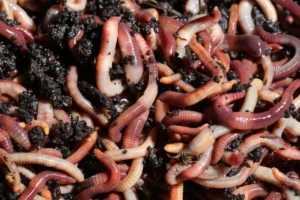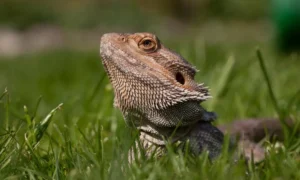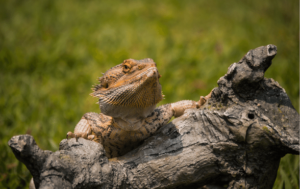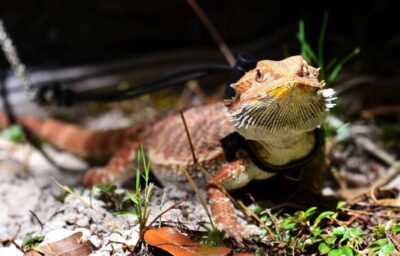Curious about what’s on the menu for your bearded dragon? Well, here’s a question that might have crossed your mind: can bearded dragons munch on nightcrawlers? These wriggly creatures, also known as earthworms, are often praised for their nutritional content.
Yes, bearded dragons can eat nightcrawlers. Nightcrawlers, also known as earthworms, are actually a nutritious and beneficial addition to a bearded dragon’s diet. They provide essential proteins and nutrients that help support your dragon’s health. However, it’s important to ensure that the nightcrawlers are sourced from a reputable supplier and are free from pesticides or other harmful chemicals.
Additionally, be sure to offer them in appropriate sizes to prevent choking hazards, and always monitor your bearded dragon while they’re eating to ensure they’re consuming their food safely. As with any new food, it’s a good idea to introduce nightcrawlers gradually and observe how your bearded dragon reacts to them.
What are Nightcrawlers?

Nightcrawlers, also known as earthworms, are a popular food choice for bearded dragons due to their high protein content and nutritional value. They are readily available in pet stores and are often sold live or freeze-dried. Bearded dragons enjoy hunting and consuming live prey, so feeding them live nightcrawlers can provide enrichment and mimic their natural feeding behaviors.
However, it’s essential to ensure that the nightcrawlers are appropriately sized for your bearded dragon to prevent choking hazards. Additionally, be sure to source nightcrawlers from reputable sources and avoid feeding wild-caught prey that may contain parasites or pesticides.
Can bearded dragons eat nightcrawlers?
Yes, bearded dragons can eat nightcrawlers (earthworms). Nightcrawlers are a nutritious and protein-rich food source for bearded dragons. They can be offered to them as part of a varied diet, along with other feeder insects and vegetables.
However, it’s crucial to ensure that the nightcrawlers are appropriately sized for your bearded dragon’s age and size to prevent any potential choking hazards. Additionally, it’s recommended to offer live nightcrawlers to stimulate natural hunting behaviors, but freeze-dried or pre-killed nightcrawlers can also be offered as an alternative.
As with any new food item, it’s essential to monitor your bearded dragon for any adverse reactions or digestive issues after introducing nightcrawlers into their diet.
Pros and Cons of Feeding Nightcrawlers to Bearded Dragons
Feeding nightcrawlers to bearded dragons can have several pros and cons:
Pros:
- Nutritional value: Nightcrawlers are high in protein, which is essential for the growth and development of bearded dragons. They also contain other nutrients such as calcium, phosphorus, and vitamins, making them a nutritious food choice.
- Enrichment: Offering live nightcrawlers can provide enrichment for bearded dragons by stimulating their natural hunting instincts. This can help keep them mentally and physically stimulated.
- Variety: Feeding nightcrawlers adds variety to a bearded dragon’s diet, which is essential for maintaining their interest in food and ensuring they receive a balanced nutritional intake.
- Easily digestible: Nightcrawlers are relatively easy for bearded dragons to digest, especially when compared to harder insects like mealworms or superworms.
Cons:
- Size: Nightcrawlers can vary in size, and it’s essential to choose ones that are an appropriate size for your bearded dragon to prevent choking hazards.
- Parasites: There is a risk of parasites when feeding live prey to bearded dragons, including nightcrawlers. It’s crucial to source nightcrawlers from reputable suppliers and ensure they are free from parasites before feeding them to your pet.
- Mess: Feeding live nightcrawlers can be messy, as they may burrow into the substrate or soil in the enclosure. This can make cleanup more challenging and may require frequent substrate changes.
- Allergies: Some bearded dragons may have allergies or sensitivities to certain types of prey, including nightcrawlers. It’s essential to monitor your pet for any signs of allergic reactions or digestive issues after introducing nightcrawlers into their diet.
Overall, while there are some potential drawbacks to feeding nightcrawlers to bearded dragons, they can be a beneficial and nutritious addition to their diet when offered in moderation and under the appropriate conditions.
Feeding Nightcrawlers to Bearded Dragons: Best Practices

Feeding nightcrawlers to bearded dragons can be a nutritious and enriching experience when done correctly. Here are some best practices to follow:
- Size selection: Choose nightcrawlers that are an appropriate size for your bearded dragon’s age and size. Nightcrawlers that are too large may pose a choking hazard, while those that are too small may not provide sufficient nutrition.
- Source reputable suppliers: Purchase nightcrawlers from reputable pet stores or suppliers to ensure they are free from parasites, pesticides, or other contaminants that could harm your bearded dragon.
- Live vs. freeze-dried: While live nightcrawlers can provide enrichment through natural hunting behavior, freeze-dried nightcrawlers are a convenient alternative that can be stored for longer periods. Consider offering a mix of both to provide variety in your bearded dragon’s diet.
- Gut loading: Gut load live nightcrawlers with nutritious foods such as leafy greens, vegetables, or commercial gut-loading diets before feeding them to your bearded dragon. This ensures that the nightcrawlers pass on additional nutrients to your pet.
- Dusting with supplements: Dust nightcrawlers with calcium and vitamin supplements before feeding them to your bearded dragon. This helps ensure your pet receives essential nutrients for bone health and overall well-being.
- Monitor feeding behavior: Watch your bearded dragon while they eat to ensure they are not experiencing any difficulties swallowing or digesting the nightcrawlers. Remove any uneaten prey after feeding to prevent spoilage and potential health issues.
- Offer a varied diet: While nightcrawlers can be a nutritious food choice, they should be part of a balanced diet that includes a variety of feeder insects, leafy greens, vegetables, and occasional fruits.
- Veterinary check-ups: Schedule regular veterinary check-ups for your bearded dragon to monitor their health and ensure they are receiving adequate nutrition from their diet, including nightcrawlers.
By following these best practices, you can safely and effectively incorporate nightcrawlers into your bearded dragon’s diet to promote their overall health and well-being.
How often should nightcrawlers be fed to bearded dragons?
The frequency of feeding nightcrawlers to bearded dragons can vary depending on factors such as the age, size, and dietary needs of the individual dragon. As a general guideline:
- Juvenile bearded dragons (up to around 6-12 months old): Offer appropriately sized live prey (including nightcrawlers) daily to support their rapid growth and development. Ensure the prey is no larger than the space between the dragon’s eyes to prevent choking hazards.
- Subadult bearded dragons (around 6-18 months old): Feed live prey, including nightcrawlers, several times per week. As they continue to grow, their appetite may decrease slightly, so adjust the frequency of feeding accordingly.
- Adult bearded dragons (18 months and older): Offer live prey, including nightcrawlers, around 2-3 times per week. Adults may require fewer feedings as they reach their full size and metabolic rate slows down.
It’s important to remember that nightcrawlers should be part of a varied diet that includes a mix of feeder insects, leafy greens, vegetables, and occasional fruits. Monitor your bearded dragon’s weight, appetite, and overall health to determine the appropriate feeding schedule and adjust as needed.
Additionally, gut-loading and supplementing the nightcrawlers with calcium and vitamins before feeding them to your dragon can help ensure they receive a balanced nutritional intake.

Signs indicate that a bearded dragon is not tolerating nightcrawlers well
If a bearded dragon is not tolerating nightcrawlers well, there may be signs or symptoms indicating digestive issues or other health concerns. Here are some signs to watch for:
- Decreased appetite: If your bearded dragon refuses to eat or shows reduced interest in food, it could be a sign that they are not tolerating the nightcrawlers well.
- Regurgitation or vomiting: If your bearded dragon regurgitates or vomits shortly after consuming nightcrawlers, it may indicate that they are having difficulty digesting them.
- Diarrhea or abnormal stools: Loose stools, diarrhea, or changes in the consistency or color of feces can be indicators of digestive upset or gastrointestinal issues.
- Lethargy or weakness: A lack of energy, lethargy, or weakness may suggest that your bearded dragon is experiencing discomfort or illness related to their diet.
- Abdominal bloating or discomfort: Swelling or bloating in the abdominal area, accompanied by signs of discomfort such as stretching, arching the back, or pressing against surfaces, may indicate gastrointestinal distress.
- Weight loss: If your bearded dragon is losing weight despite regular feeding, it could be a sign that they are not tolerating their diet well or are experiencing health issues.
If you notice any of these signs or symptoms in your bearded dragon after feeding them nightcrawlers, it’s essential to stop feeding them immediately and consult with a reptile veterinarian. They can assess your dragon’s health, provide appropriate treatment, and offer guidance on adjusting their diet to ensure they receive proper nutrition without experiencing adverse effects.
Conclusion
Can bearded dragons eat nightcrawlers? Yes, bearded dragons can eat nightcrawlers as part of a balanced diet. Nightcrawlers provide essential nutrients and enrichment, but it’s crucial to select appropriately sized prey, monitor for signs of digestive upset, and source from reputable suppliers.
Offering nightcrawlers in moderation, along with a variety of other feeder insects and vegetables, can contribute to the overall health and well-being of bearded dragons.

